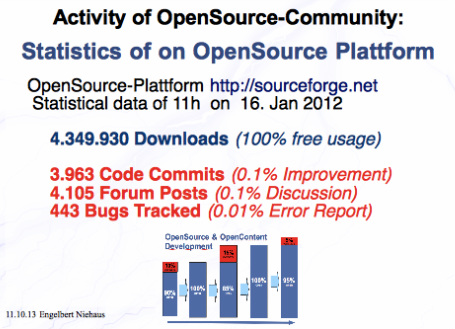Definition: Open Community (OC)
Open Community is a generalization of the concept of OpenSource and OpenContent to other collaborative effort. The term “open” for an open community refers to the opportunity for anyone to join and contribute to the collaborative effort. The direction and goals are determined collaboratively by all members of the community. The resulting work (“product”) is made available under a free license, so that other communities can adapt and build on them. In this context the “product” of the open community is an “improved public health by application of space technologies”.
Remark:
´An OpenCommunity prefers to use open scientific, educational and technological resources to accomplish risk mitigation:
- OpenSource-Software (see List of OpenSource Software)
- OpenContent (e.g. Creative Commons License and Open Educational Resources OER )
- Open Proposal Management
- Open Projects, e.g. Reference to helpful existing Projects
- Green Open Access Concept (in contrast to Gold Standard to assure
- Open Certification Management (e.g. Mozialla Open Badges & Badge Alliance)
The Open Content and Open Source Software applied for Public Health Risk Mitigation are Part of Joint Repository of Resources.
- Open Community Approach & Access to Knowledge and Publication Channels have Implications for Non-OpenAccess & OpenAccess Journals.
- Green Open Access (see ArXiv-Comment) in context of >>Versioning allows to see "Who contributed what and when" e.g. on >>GitHub.
- For Capacity Building and e-Learning Open Source and Open Content refer to Open Educational Resources (Wiki) and contributes to >>Sustainable Development Goal 4 - Qualitiy Education
Expected Percentage of Participation in an OC
According to statistics on OpenSource Portals only 1 out of 1000 users/scientists/... of Open Source software will contribute to improvements, like bug tracking, code commits or documentation of the software. So AT6FUI will remain most likely a small community of people that donate their labor force to Public Health Risk Mitigation.
This can be improved if the Open Community Approach is integrated in collaborative efforts for and policy of Public Health Agencies, Academic institutions and Funding Agencies for projects. The FAIR data principle can guide underlying policies, that allow to adapt results from one regional and local application of Public Health Risk Mitigation to other applications in other member states. Language, media and other Open Educational Resource (OER) can be modified and adapted to the local and regional requirements and constraints in other UN Members states. Furthermore if the financial constraints could be reduced towards low cost application fo risk mitigation more people can benefit from risk mitigation strategies with the same investment and the impact of that low cost resources might be higher on Public Health, even if the efficiency of a single application of resources might be less in comparison to commercial solutions.


